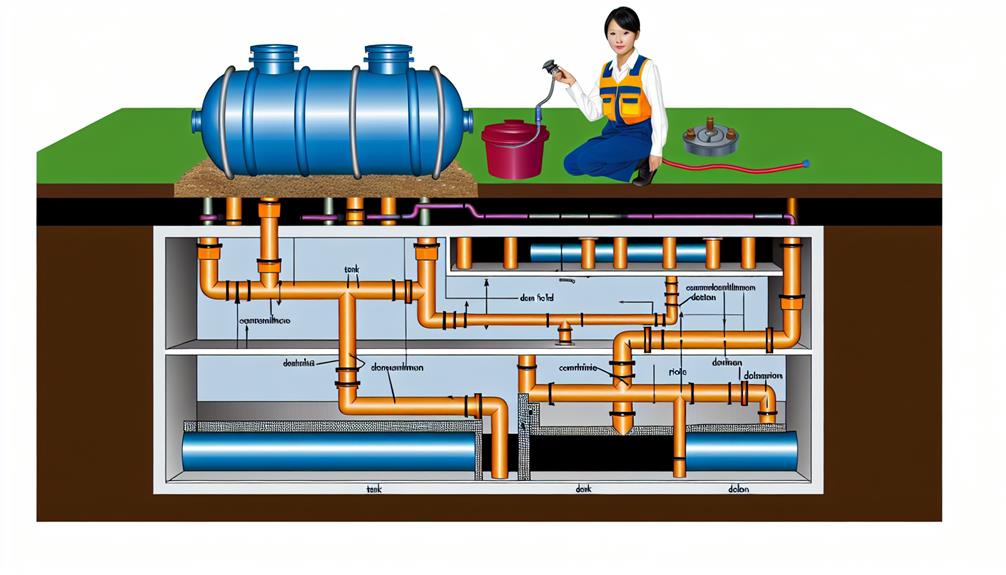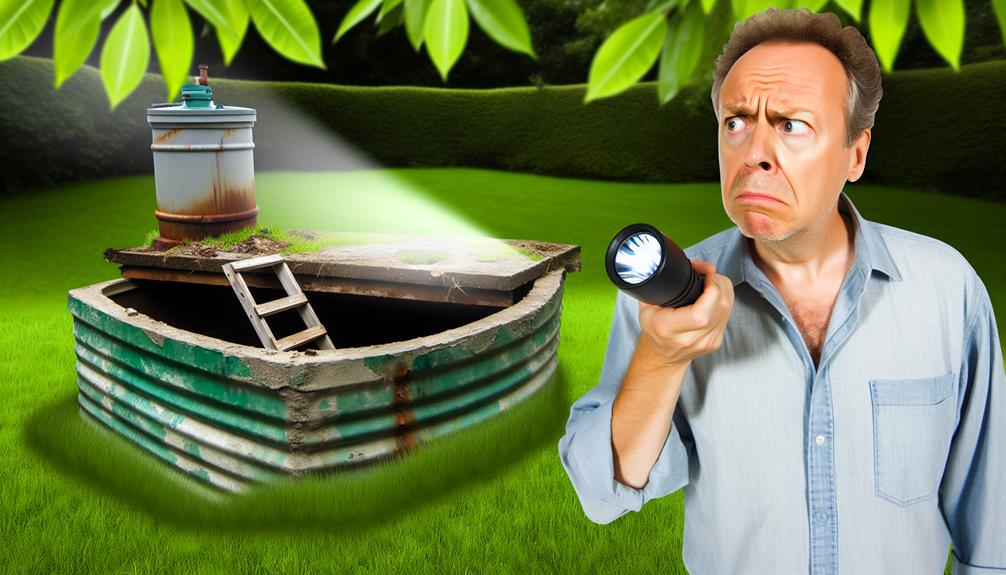Discover how to protect your septic system from breakdown with...
Read MoreYou & Your Septic Tank
Essential Septic System Maintenance: Key Tips and Insights
Our professional septic service team offers comprehensive septic tank pumping services to keep your system running smoothly. Get a FREE Quote Today.

Essential Septic System Maintenance: Key Tips and Insights
Sure, because nothing quite says ‘home sweet home’ like a well-maintained septic system, right?
But in all seriousness, if you’re a homeowner with a septic system, you know it’s not something you can ignore. Regular maintenance is crucial to keep everything running smoothly and to prevent costly repairs down the line.
But don’t worry, you don’t have to be a septic system expert to keep your system in check. There are some simple steps you can take to make sure your system stays in good shape.
So, where should you start, you ask? Well, that’s the part we’ll get into next.
Key Takeaways
- Regular septic tank pumping is crucial for preventing health hazards, maintaining system efficiency, and prolonging the lifespan of the septic tank.
- Identifying septic system problems early through indicators like slow draining sinks, unpleasant odors, and lush grass around the drain field is important to avoid system failure.
- DIY septic system maintenance tips include routine inspections, water conservation, proper waste disposal, using eco-friendly cleaners, and spreading out water use throughout the day.
- Professional septic system services may be necessary for complex systems, legal requirements, emergencies, and offer comprehensive solutions, including maintenance, repairs, and emergency response.
Understanding Septic System Basics

Before you can effectively maintain your septic system, it’s crucial to understand its basic components and how they function together. A typical septic system design includes a tank, drain field, and soil. Raw sewage from your home flows into the septic tank, where it’s separated into three layers: scum (lighter waste that floats), sludge (heavier solids that sink), and effluent (liquid waste in the middle).
The waste decomposition process begins in the tank. Bacteria break down the solids, turning them into liquid and gases. The partially treated wastewater, or effluent, then flows into the drain field. Here, it’s further treated as it percolates through the soil, which naturally removes harmful bacteria, viruses, and nutrients.
Understanding this process is essential to maintain your system effectively. Regular pumping of your septic tank ensures that it doesn’t get overloaded with solids, which can clog the drain field. Also, be aware of what you’re flushing, as not everything breaks down easily.
Regular Septic Tank Pumping Importance
Regularly pumping your septic tank plays a critical role in maintaining the efficiency and longevity of your entire septic system. It’s an essential task that helps prevent health hazards and costly repairs. There are several reasons why regular septic tank pumping is vital:
- Health Hazards Prevention: Septic tank overflow can contaminate groundwater, posing serious health risks. Regular pumping helps avoid such scenarios.
- Efficiency: Regular pumping ensures that your septic system functions effectively, reducing chances of blockages or backups.
- Longevity: A well-maintained septic tank can serve you for many years, saving you from premature replacement costs.
- Pumping Frequency Factors: The frequency of pumping depends on various factors, including tank size, number of household members, and amount of wastewater generated.
You can’t overlook these factors if you’re keen on maintaining your system’s performance. Regular pumping, guided by the appropriate pumping frequency factors, is crucial for a well-functioning septic system.
It’s not just about keeping your home clean; it’s about ensuring the safety and health of your family and the surrounding environment. Make it a priority to schedule regular septic tank pumping and enjoy the peace of mind that comes with a well-maintained system.
Identifying Septic System Problems

While ensuring the regular pumping of your septic tank is crucial, it’s equally important to promptly identify and address any septic system issues before they escalate into bigger problems. One of the first steps in identifying septic system problems involves being keen on problem indicators. These include slow draining sinks or toilets, unpleasant odors, or even unusually lush and green grass around the drain field.
To keep your system running efficiently, you need to understand the common system failure causes. Overloading the system by using too much water, flushing non-degradable items, and lack of regular maintenance can lead to system failure.
Should you notice any of these problem indicators, it’s essential to consult a professional immediately. They’ve the requisite tools and expertise to diagnose and fix the issue. Regular inspections can also help identify potential issues before they become problematic. This is because some problems, like roots intruding into the system or a tank leak, mightn’t manifest immediately.
DIY Septic System Maintenance Tips
Maintaining your septic system doesn’t have to be a daunting task; with a few simple DIY tips, you can help ensure its long-term efficiency and reliability.
Here are four key steps to help you maintain your septic system:
- Routine Inspections: Inspect your septic system regularly. Note any signs of leaks, blockages, or damage. Regular checks are part of good emergency preparedness and can save you from expensive repairs.
- Efficient Water Use: Conserve water to reduce the strain on your septic system. This includes fixing leaks, using high-efficiency appliances, and spreading out water use throughout the day.
- Proper Waste Disposal: Avoid flushing anything other than human waste and toilet paper down the toilet. Excessive or inappropriate materials in your septic system can cause clogs and damage.
- Homemade Cleaners: Use eco-friendly homemade cleaners, which are often gentler on your septic system. Commercial cleaners can contain harsh chemicals that harm the beneficial bacteria in your septic tank.
Professional Septic System Services

Even with the best DIY efforts, there comes a time when you might need to call in the professionals for your septic system services. Many factors can necessitate this, such as system complexity, legal requirements, or an emergency situation. A professional service can offer comprehensive solutions, from regular maintenance, repairs to emergency response measures.
Service costs analysis is crucial to understanding the economic aspect of employing professional septic system services. It’s important to note that while these services might seem expensive initially, they can save you from costly repairs in the long run.
Here is a simple breakdown:
| Service | Estimated Cost |
|---|---|
| Initial Inspection | $100 – $200 |
| Pumping | $200 – $400 |
| Repair | $500 – $1500 |
| Emergency Services | $300 – $500 |
| Maintenance Contract | $250 – $500/year |
Frequently Asked Questions
What Are Some Common Misconceptions About Septic System Maintenance?
You’re often misled by Septic Myths Debunked, believing you don’t need regular pumping or chemicals will suffice. Misunderstood Septic Practices also include thinking all waste is acceptable. Let’s clarify these misconceptions.
How Does the Local Climate or Weather Conditions Affect the Performance of a Septic System?
Climate adaptation’s crucial for your septic system. Extreme cold can freeze pipes, while intense heat may evaporate necessary liquids. Seasonal impact matters, so weather-proof your system to ensure it doesn’t buckle under Mother Nature’s whims.
What Are the Potential Health Risks Associated With a Poorly Maintained Septic System?
If you neglect your septic system, you’re risking disease transmission and contaminant exposure. Overflowing waste can contaminate your water supply, causing gastrointestinal illnesses, hepatitis, and other serious health issues. Regular maintenance is crucial to prevent these risks.
Are There Any Eco-Friendly Alternatives to Traditional Septic Systems?
Yes, there are. You can explore ‘Green Technologies’ that offer sustainable plumbing options. These systems, like composting toilets and greywater systems, are eco-friendly alternatives to traditional septic systems, benefiting both you and the environment.
What Kind of Impact Can a Septic System Have on the Value of a Property?
A well-maintained septic system can enhance your property value due to its long lifespan. However, poor maintenance can decrease it. That’s why it’s crucial to prioritize property inspections to ensure your system’s health.
Conclusion
Maintaining your septic system is akin to tuning a fine orchestra; every part must play in harmony to avoid a disastrous performance.
Don’t overlook regular pumping and stay alert for potential problems.
A little DIY maintenance can go a long way, but don’t hesitate to bring in the pros when needed.
Treat your septic system with care and it’ll reward you with reliable, long-lasting service.
Remember, a well-tuned septic system is music to everyone’s noses.
You may also like...
Why Are DIY Fixes Essential for Septic Tank Pumping?
Tap into the importance of DIY fixes for septic tank...
Read MoreUnveiling the Average Costs of Septic Tank Pumping
Master the mysteries of septic tank pumping costs and avoid...
Read More
The Best Septic Tank Pumping Services Near You

Answer Some Questions
Let us know about your needs so we can find you the right septic tank pros.

Get Quotes
We will put you in touch with the right septic tank pros for your job and location.

Hire Right
Compare quotes, message or call pros, and hire only when ready.



